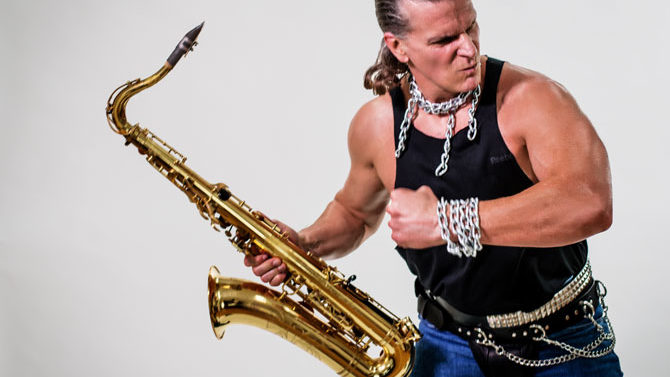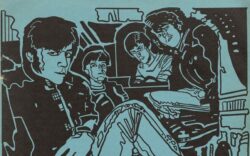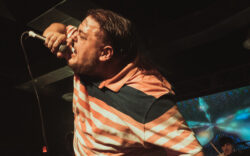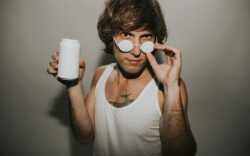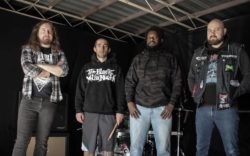For decades, Tim Cappello served as a sideman and multi-instrumentalist sharing stages, recording and acting with a laundry list of celebrities, including Tina Turner, Ringo Starr, Peter Gabriel, Bob Dylan, Billy Crystal, Carly Simon, Gregory Hines and more. He studied at the New England Conservatory of Music with renowned improv jazz pianist and instructor Lennie Tristano. His early ’80s shock-rock band The Ken Dolls were banned from playing Manhattan’s famed CBGB punk dive due to the softcore porno flicks he created to accompany their live shows.
Cappello’s life and musical career are the stuff of legend, yet everything he’s accomplished pales in comparison to the notoriety he gained from the mere 12 seconds of screen time that he landed in director Joel Schumacher’s 1987 teen-angst vampire classic The Lost Boys. With his pro-wrestler physique, wailing saxophone and a pelvic thrust that registers on the Richter scale, Cappello is a pop culture icon known to most as the real Sexy Sax Man.
Since releasing his 2018 debut CD, Blood on the Reed, Cappello has been touring the country as a one-man act. At 64 years old, it’s his first real endeavor taking the stage as the star of the show. Along the way, he’s encountered an overwhelming response from audiences, surpassing anything he could have possibly anticipated.
“No one seemed to care about me when I was their age,” Cappello says. “Then, no one gave a shit about me when I was their father’s age. But now that I’m their grandfather’s age, I’m meeting all of these young people that have tattoos of me,” he laughs. “Since I’ve been out on the road, I must have met 150 people who have a tattoo of me on their bodies.”
In conversation, Cappello’s warm demeanor and New York accent underscore a down-to-earth sense of humor while he parses out the irony behind his fame and the genuine interest that he sparks in people. “Of course, it’s the sort of thing that happens,” he says. “I spent 40 years playing second banana, and now I’ve stepped out to do my own thing.”
The unexpected rise in cult-like fandom might leave Cappello somewhat perplexed, but he’s buzzing with the newly found energy of connecting with a whole new audience. During his shows, Cappello thrives on engaging everyone in the room, both onstage and off. Each night, he tears into his sax, peeling through numbers from Blood on the Reed—mostly classics, including a ramped up version of Screamin’ Jay Hawkins’ “I Put a Spell on You,” a skronking cover of the Champs’ 1958 hit “Tequila” and the number that made him famous during his Lost Boys performance, “I Still Believe,” originally penned by San Francisco alt-rock outfit The Call.
Cappello still makes films to accompany his shows. They tend to be a bit more family-friendly these days, though not without a sense of humor. Onstage, he uses QLab software and foot pedals to create loops and fugue-like moments of spontaneity to riff on and work up the room. There’s always a heavy round of audience participation built into his performances. Between each song, Cappello is all about the crowd banter.
One bit that he works into the shows each night is a film that involves a dance routine in which he leads the crowd through a few simple, choreographed moves to sway along with Lost Boys character Star (played by actress Jami Gertz) during the scene where she dances along with Cappello’s famed appearance.
“I’m having a ball up there onstage at every show,” Cappello says. “I am scanning the audience, looking for those smiling faces—people who don’t even realize they’re smiling, because they’re having so much fun.”
Afterward, of course, he sticks around to meet the fans. “Sometimes, people just want to say a few words, take a picture, get a hug,” he says. “Sometimes, they want to talk about how their mother took them to see Tina Turner when they were a kid, or turned them on to The Lost Boys,” he adds. “Sometimes I’ll have three generations of Lost Boys fans come up and talk to me after a show. Meeting people and having this real-world interaction is a really important part of the whole experience, for me and for everyone else who’s come out to see the show.”
Like what you just read? Support Flagpole by making a donation today. Every dollar you give helps fund our ongoing mission to provide Athens with quality, independent journalism.



